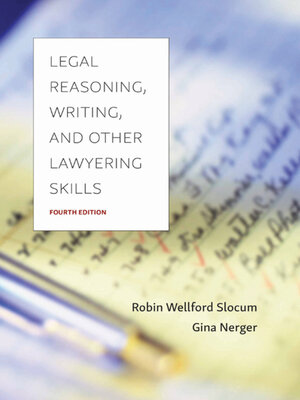
Sign up to save your library
With an OverDrive account, you can save your favorite libraries for at-a-glance information about availability. Find out more about OverDrive accounts.
Find this title in Libby, the library reading app by OverDrive.



Search for a digital library with this title
Title found at these libraries:
| Loading... |
The fourth edition of Legal Reasoning, Writing and Other Lawyering Skills draws on lessons from neuroscience and psychology to deepen students' understanding of self and others, and of the emotional biases and filters that undermine their efforts to "think like a lawyer." The fourth edition retains the same core chapters of earlier editions that emphasize and illustrate the "process" of thinking through, and writing about, a client problem. Within those core chapters, however, the fourth edition refines and adds clarity to foundational concepts.
For example, the fourth edition distinguishes between types of client conclusions within legal analysis—ultimate conclusions and legal issue conclusions, and it breaks down the types of reasoning provided within court opinions—explanatory reasoning and application reasoning. These labels foster deeper understanding of the core concepts needed to engage in legal analysis. The fourth edition also provides a more specific formula for successfully drafting rule statements for use within memorandums and briefs.
In addition, the fourth edition retains chapters covering the practicalities of modern-day legal practice, with a focus on documents students will draft in day-to-day law practice, from client letters, email responses, demand/settlement letters, and trial briefs. The fourth edition adds a new chapter on drafting summary judgment briefs, and introduces students to working with and citing record evidence. It also adds additional exercises throughout for more hands-on learning opportunities. This book can be used in a typical two-semester legal skills course, as well as more intensive two-semester courses, and three- and even four-semester courses.






